Thomas James Richards, Diaries, Transcript Vol. 2 - Part 20
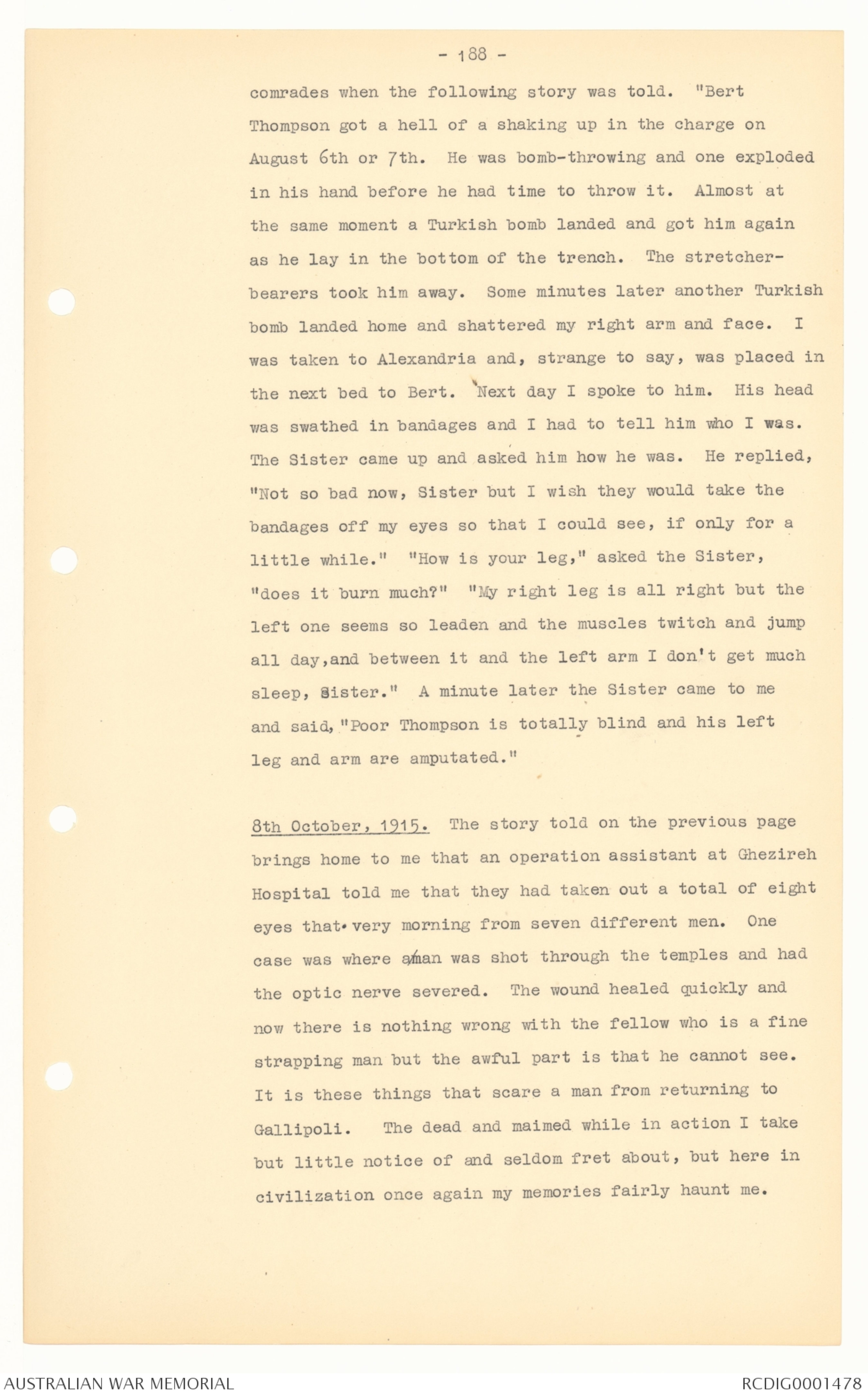
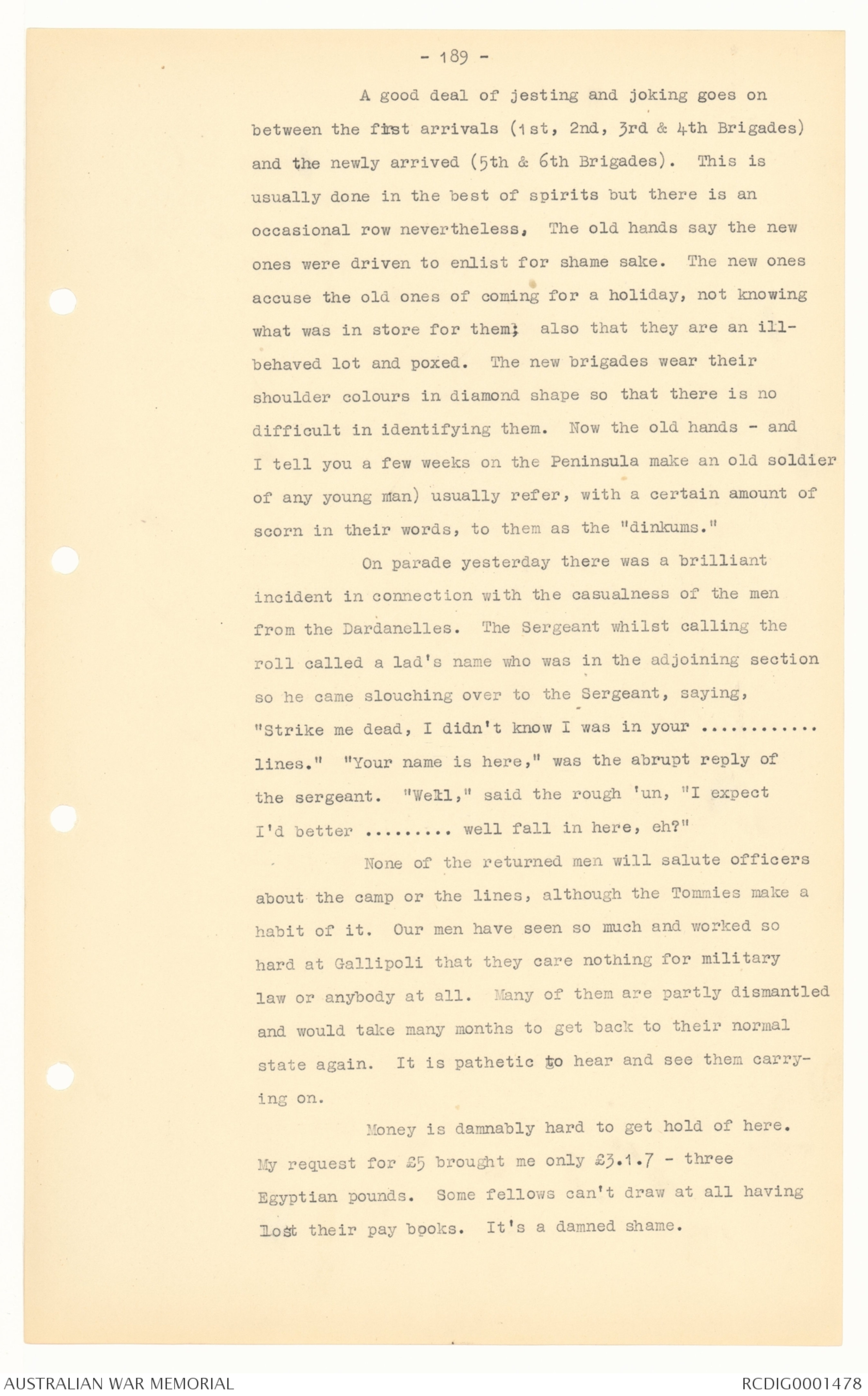
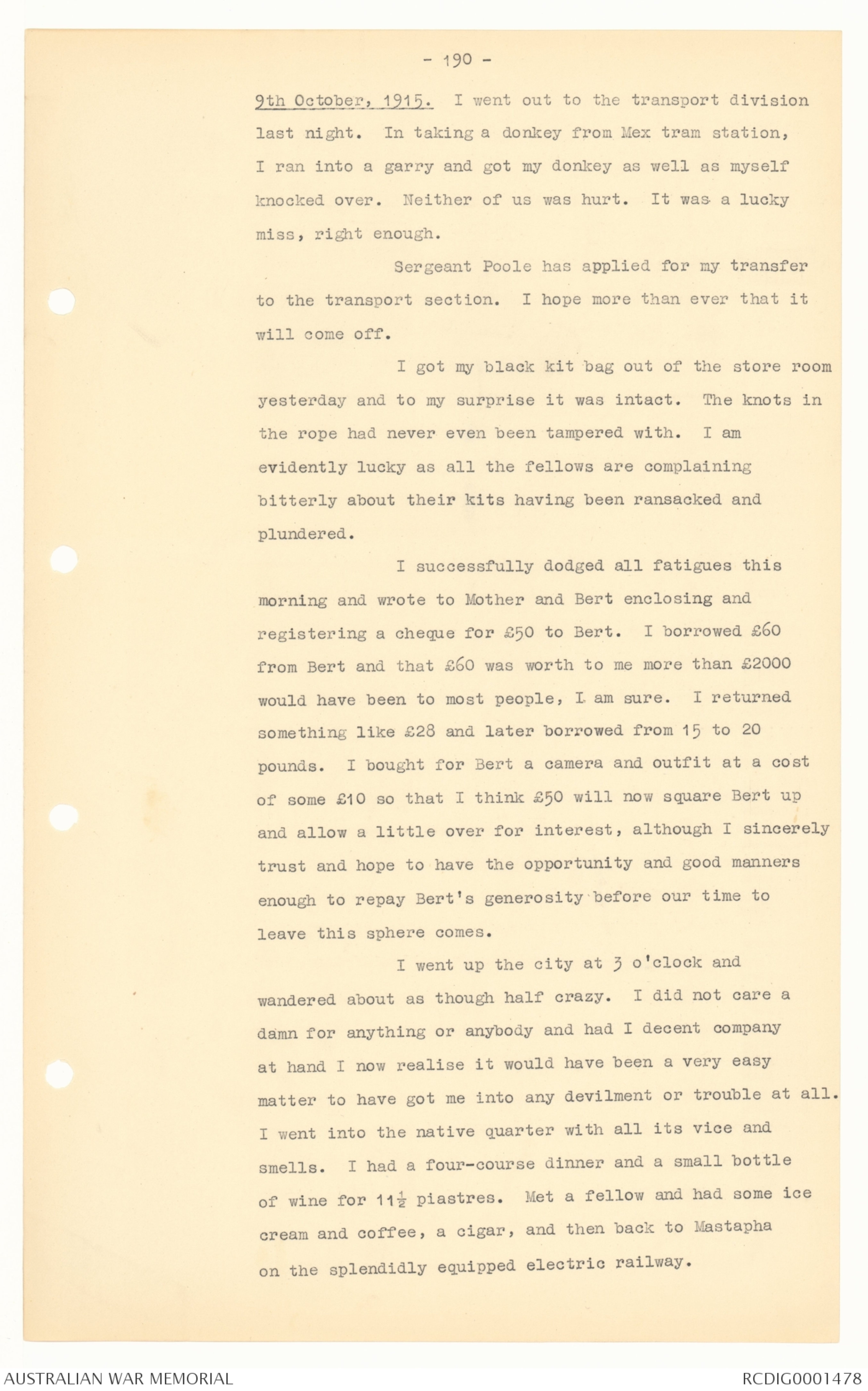
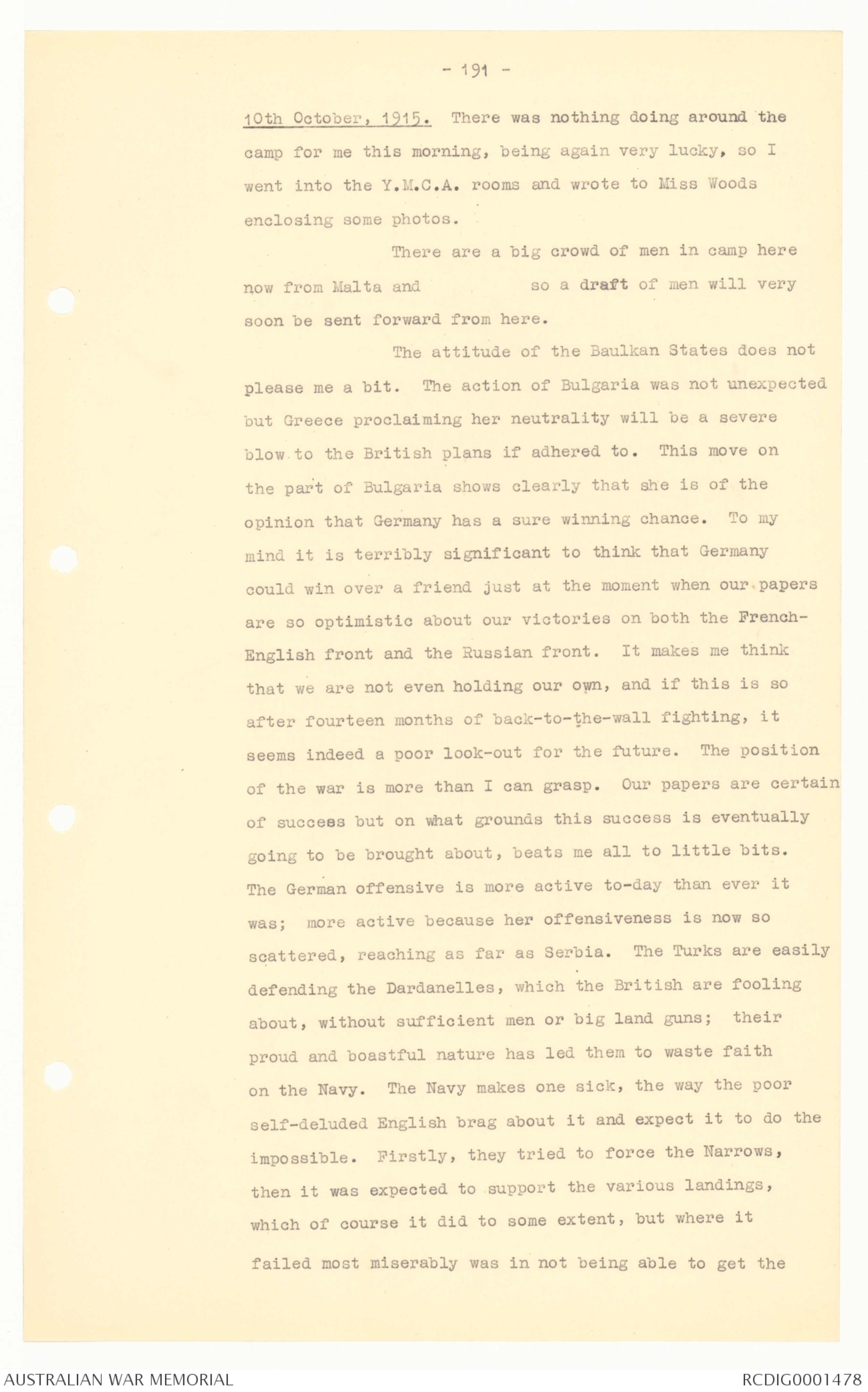
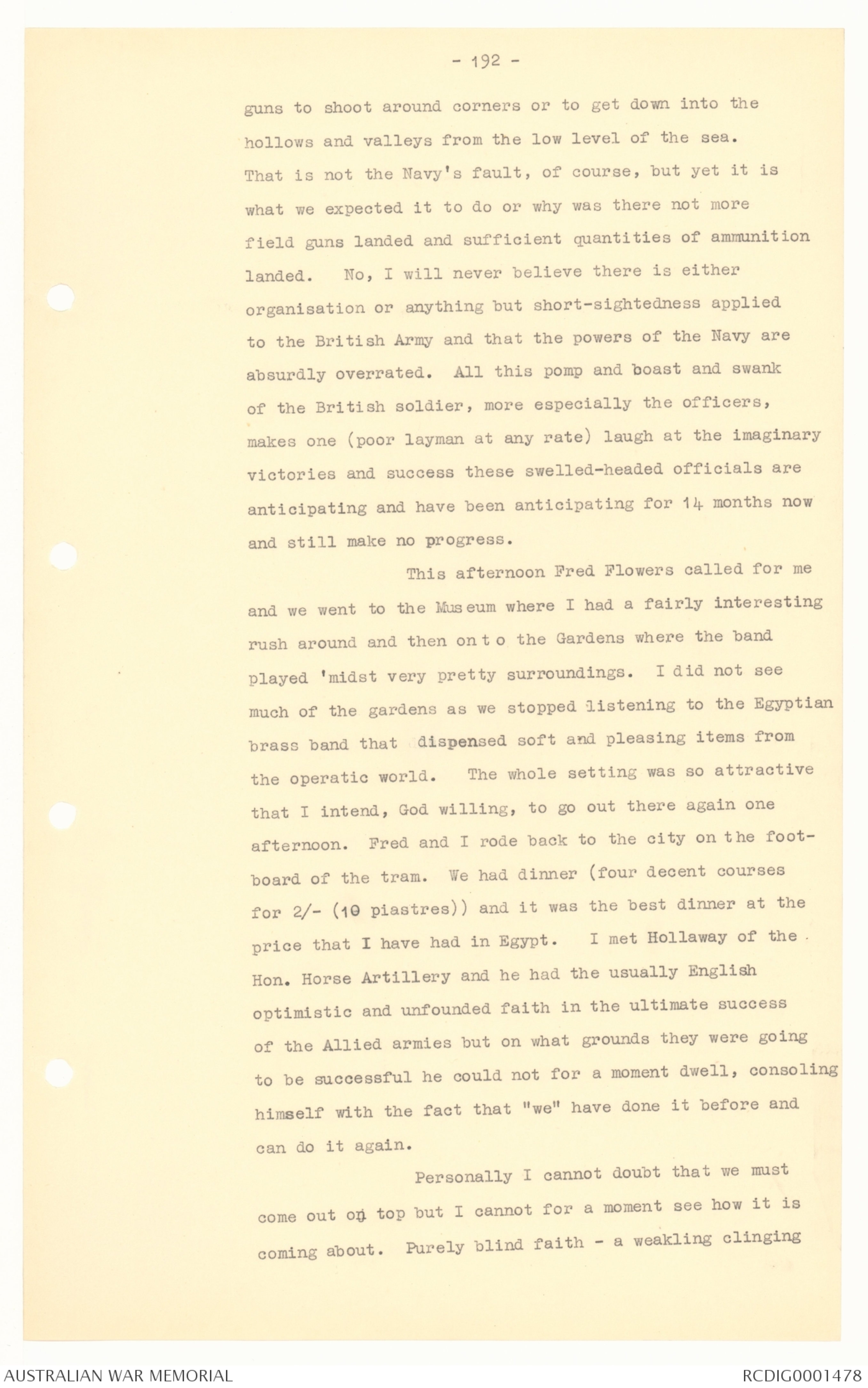
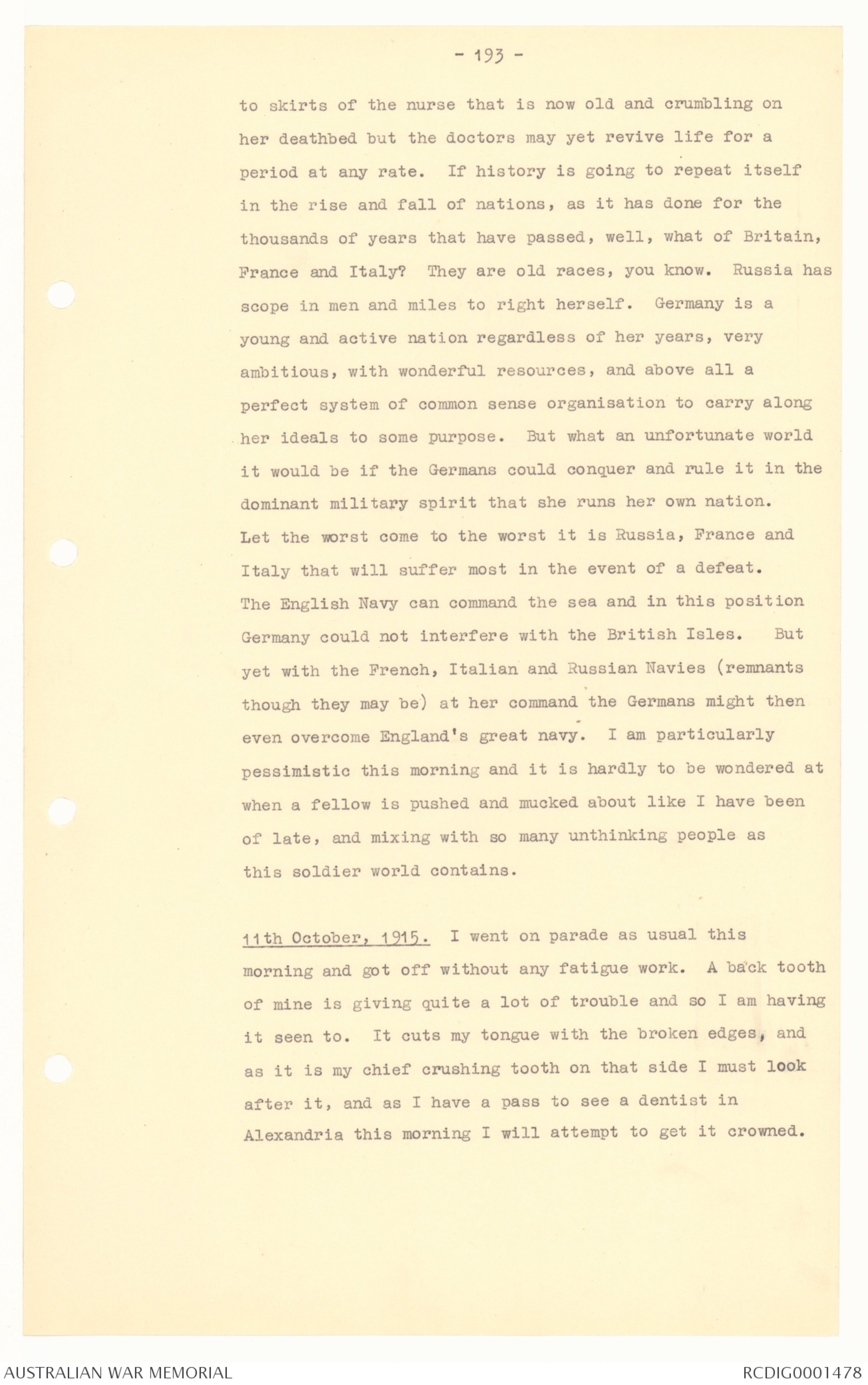
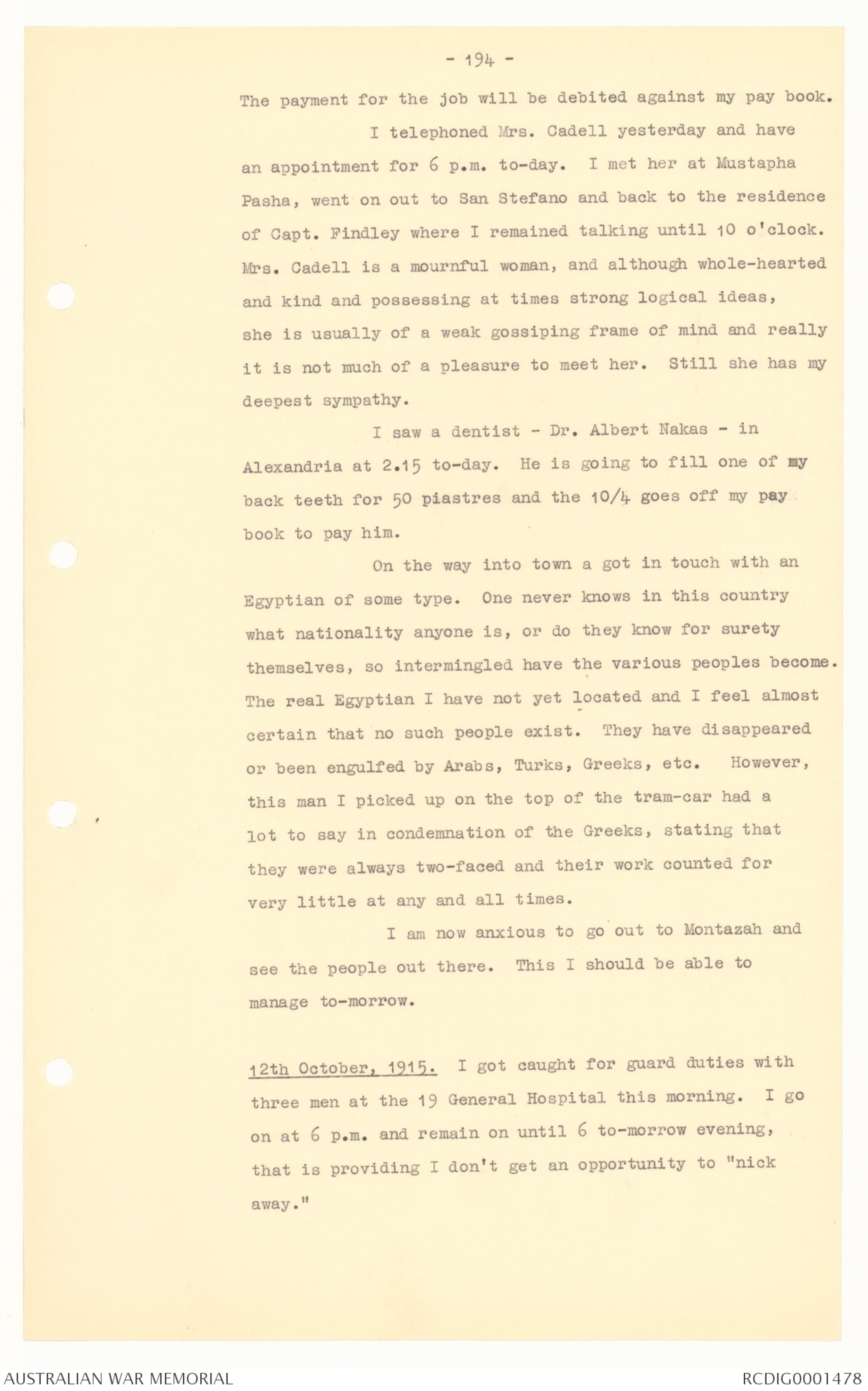
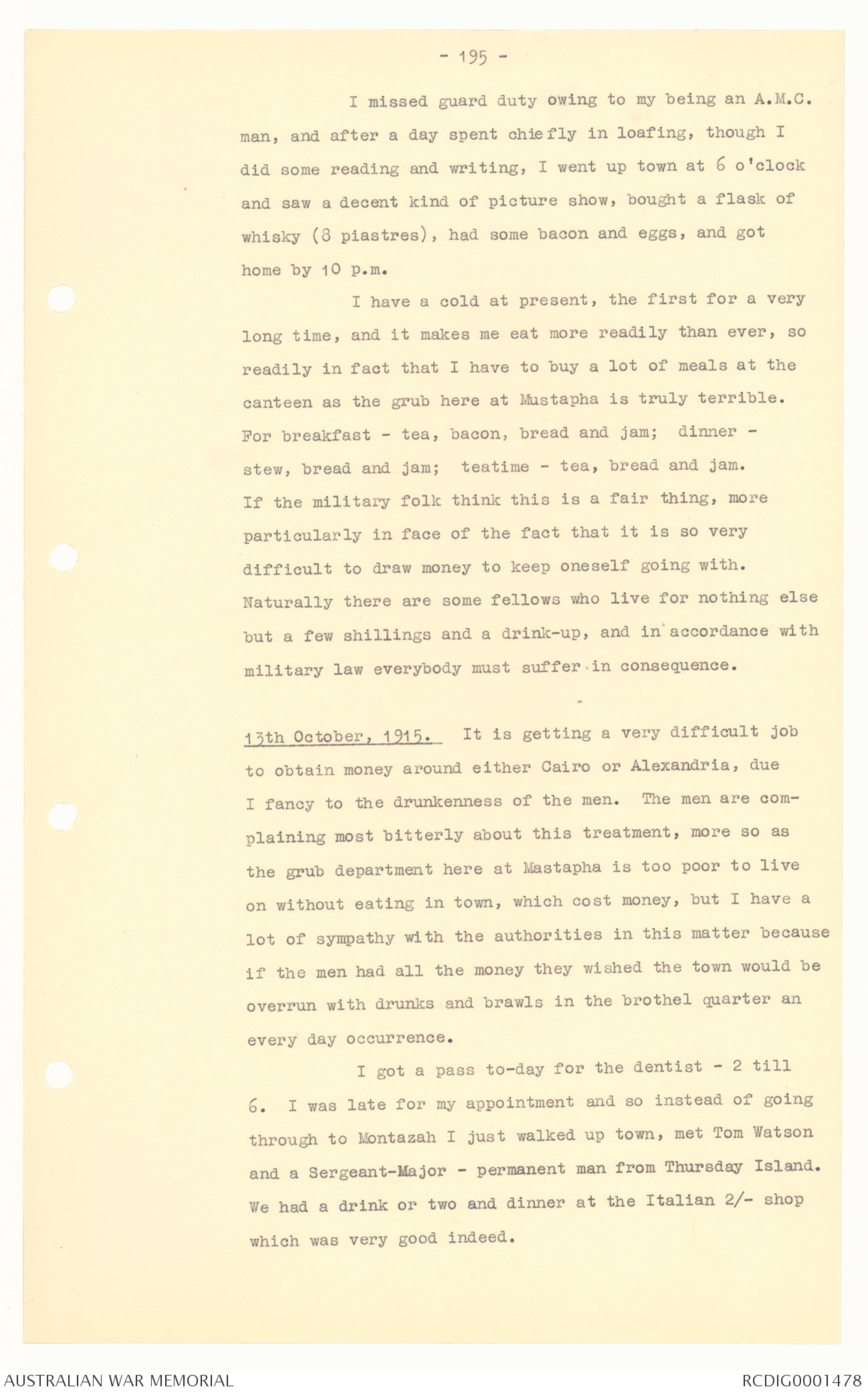
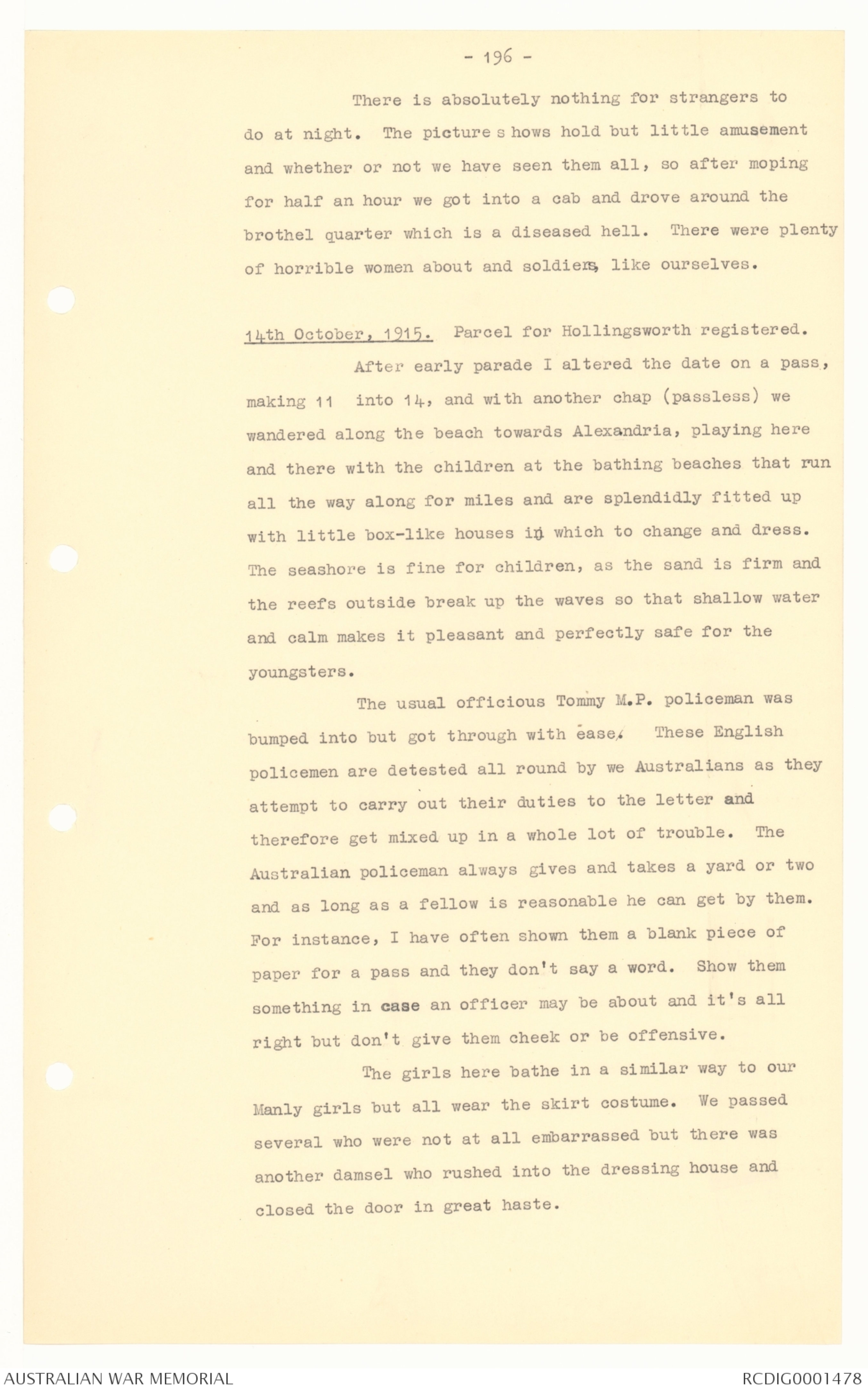
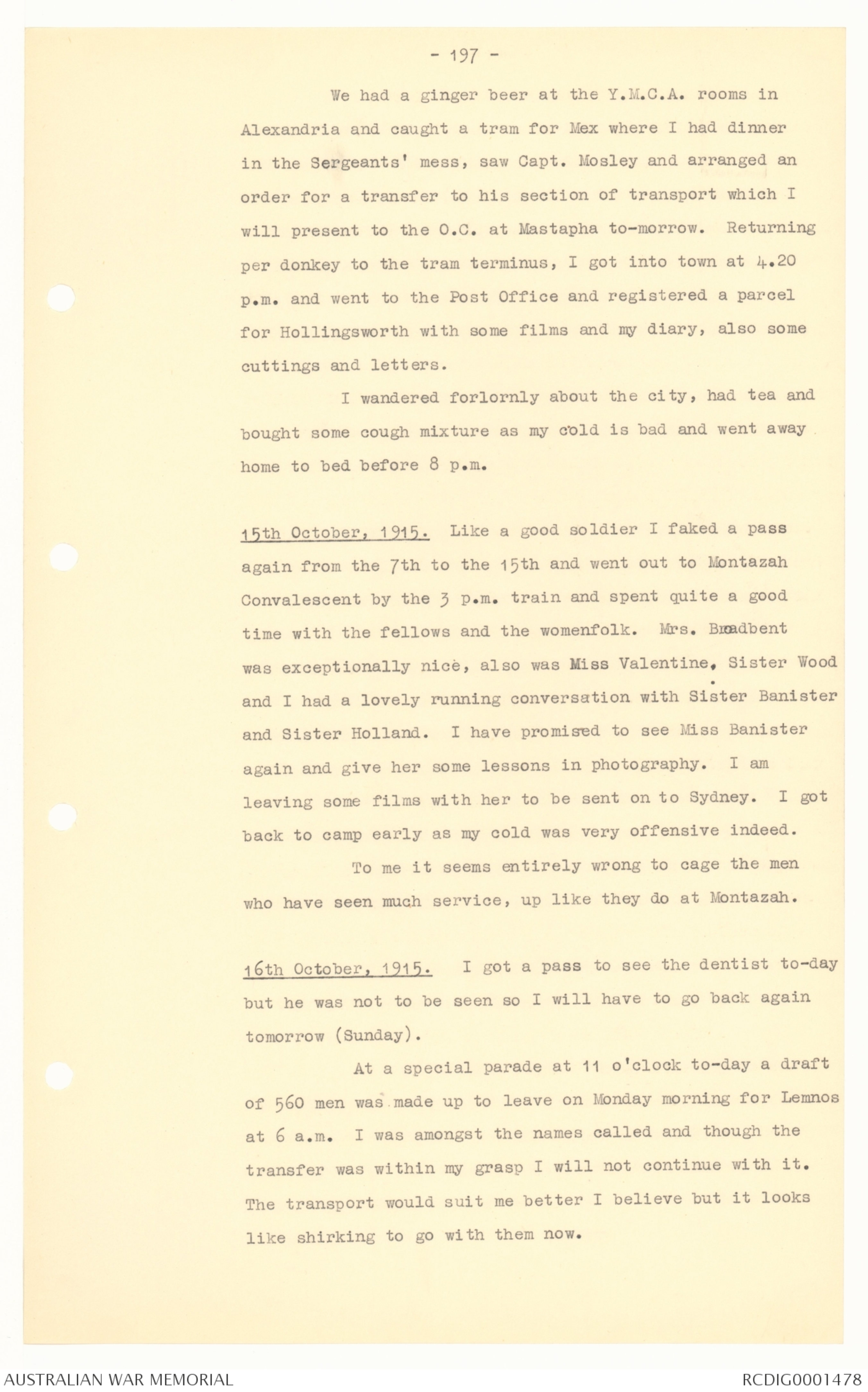
- 188 -
comrades when the following story was told. "Bert
Thompson got a hell of a shaking up in the charge on
August 6th or 7th. He was bomb-throwing and one exploded
in his hand before he had time to throw it. Almost at
the same moment a Turkish bomb landed and got him again
as he lay in the bottom of the trench. The stretcher-bearers
took him away. Some minutes later another Turkish
bomb landed home and shattered my right arm and face. I
was taken to Alexandria and, strange to say, was placed in
the next bed to Bert. Next day I spoke to him. His head
was swathed in bandages and I had to tell him who I was.
The Sister came up and asked him how he was. He replied,
"Not so bad now, Sister but I wish they would take the
bandages off my eyes so that I could see, if only for a
little while." "How is your leg," asked the Sister,
"does it burn much?" "My right leg is all right but the
left one seems so leaden and the muscles twitch and jump
all day, and between it and the left arm I don't get much
sleep, Sister." A minute later the Sister came to me
and said, "Poor Thompson is totally blind and his left
leg and arm are amputated."
8th October, 1915. The story told on the previous page
brings home to me that an operation assistant at Ghezireh
Hospital told me that they had taken out a total of eight
eyes that very morning from seven different men. One
case was where a/man was shot through the temples and had
the optic nerve severed. The wound healed quickly and
now there is nothing wrong with the fellow who is a fine
strapping man but the awful part is that he cannot see.
It is these things that scare a man from returning to
Gallipoli. The dead and maimed while in action I take
but little notice of and seldom fret about, but here in
civilization once again my memories fairly haunt me.
- 189 -
A good deal of jesting and joking goes on
between the first arrivals (1st, 2nd, 3rd & 4th Brigades)
and the newly arrived (5th & 6th Brigades). This is
usually done in the best of spirits but there is an
occasional row nevertheless, The old hands say the new
ones were driven to enlist for shame sake. The new ones
accuse the old ones of coming for a holiday, not knowing
what was in store for them; also that they are an ill-behaved
lot and poxed. The new brigades wear their
shoulder colours in diamond shape so that there is no
difficult in identifying them. Now the old hands - and
I tell you a few weeks on the Peninsula make an old soldier
of any young man) usually refer, with a certain amount of
scorn in their words, to them as the "dinkums."
On parade yesterday there was a brilliant
incident in connection with the casualness of the men
from the Dardanelles. The Sergeant whilst calling the
roll called a lad's name who was in the adjoining section
so he came slouching over to the Sergeant, saying,
"Strike me dead, I didn't know I was in your . . . . . . .
lines." "Your name is here," was the abrupt reply of
the sergeant. "Well," said the rough 'un, "I expect
I'd better . . . . . . . .. well fall in here, eh?"
None of the returned men will salute officers
about the camp or the lines, although the Tommies make a
habit of it. Our men have seen so much and worked so
hard at Gallipoli that they care nothing for military
law or anybody at all. Many of them are partly dismantled
and would take many months to get back to their normal
state again. It is pathetic to hear and see them carrying
on.
Money is damnably hard to get hold of here.
My request for £5 brought me only £3.1.7 - three
Egyptian pounds. Some fellows can't draw at all having
lost their pay books. It's a damned shame.
- 190 -
9th October, 1915. I went out to the transport division
last night. In taking a donkey from Mex tram station,
I ran into a garry and got my donkey as well as myself
knocked over. Neither of us was hurt. It was a lucky
miss, right enough.
Sergeant Poole has applied for my transfer
to the transport section. I hope more than ever that it
will come off.
I got my black kit bag out of the store room
yesterday and to my surprise it was intact. The knots in
the rope had never even been tampered with. I am
evidently lucky as all the fellows are complaining
bitterly about their kits having been ransacked and
plundered.
I successfully dodged all fatigues this
morning and wrote to Mother and Bert enclosing and
registering a cheque for £50 to Bert. I borrowed £60
from Bert and that £60 was worth to me more than £2000
would have been to most people, I am sure. I returned
something like £28 and later borrowed from 15 to 20
pounds. I bought for Bert a camera and outfit at a cost
of some £10 so that I think £50 will now square Bert up
and allow a little over for interest, although I sincerely
trust and hope to have the opportunity and good manners
enough to repay Bert's generosity before our time to
leave this sphere comes.
I went up the city at 3 o'clock and
wandered about as though half crazy. I did not care a
damn for anything or anybody and had I decent company
at hand I now realise it would have been a very easy
matter to have got me into any devilment or trouble at all.
I went into the native quarter with all its vice and
smells. I had a four-course dinner and a small bottle
of wine for 11 ½ piastres. Met a fellow and had some ice
cream and coffee, a cigar, and then back to Mastapha
on the splendidly equipped electric railway.
- 191 -
10th October, 1915. There was nothing doing around the
camp for me this morning, being again very lucky, so I
went into the Y.M.C.A. rooms and wrote to Miss Woods
enclosing some photos.
There are a big crowd of men in camp here
now from Malta and so a draft of men will very
soon be sent forward from here.
The attitude of the Baulkan States does not
please me a bit. The action of Bulgaria was not unexpected
but Greece proclaiming her neutrality will be a severe
blow to the British plans if adhered to. This move on
the part of Bulgaria shows clearly that she is of the
opinion that Germany has a sure winning chance. To my
mind it is terribly significant to think that Germany
could win over a friend just at the moment when our papers
are so optimistic about our victories on both the French-English
front and the Russian front. It makes me think
that we are not even holding our own, and if this is so
after fourteen months of back-to-the-wall fighting, it
seems indeed a poor look-out for the future. The position
of the war is more than I can grasp. Our papers are certain
of success but on what grounds this success is eventually
going to be brought about, beats me all to little bits.
The German offensive is more active to-day than ever it
was; more active because her offensiveness is now so
scattered, reaching as far as Serbia. The Turks are easily
defending the Dardanelles, which the British are fooling
about, without sufficient men or big land guns; their
proud and boastful nature has led them to waste faith
on the Navy. The Navy makes one sick, the way the poor
self-deluded English brag about it and expect it to do the
impossible. Firstly, they tried to force the Narrows,
then it was expected to support the various landings,
which of course it did to some extent, but where it
failed most miserably was in not being able to get the
- 192 -
guns to shoot around corners or to get down into the
hollows and valleys from the low level of the sea.
That is not the Navy's fault, of course, but yet it is
what we expected it to do or why was there not more
field guns landed and sufficient quantities of ammunition
landed. No, I will never believe there is either
organisation or anything but short-sightedness applied
to the British Army and that the powers of the Navy are
absurdly overrated. All this pomp and boast and swank
of the British soldier, more especially the officers,
makes one (poor layman at any rate) laugh at the imaginary
victories and success these swelled-headed officials are
anticipating and have been anticipating for 14 months now
and still make no progress.
This afternoon Fred Flowers called for me
and we went to the Museum where I had a fairly interesting
rush around and then on to the Gardens where the band
played 'midst very pretty surroundings. I did not see
much of the gardens as we stopped listening to the Egyptian
brass band that dispensed soft and pleasing items from
the operatic world. The whole setting was so attractive
that I intend, God willing, to go out there again one
afternoon. Fred and I rode back to the city on the footboard
of the tram. We had dinner (four decent courses
for 2/- (10 piastres)) and it was the best dinner at the
price that I have had in Egypt. I met Hollaway of the
Hon. Horse Artillery and he had the usually English
optimistic and unfounded faith in the ultimate success
of the Allied armies but on what grounds they were going
to be successful he could not for a moment dwell, consoling
himself with the fact that "we" have done it before and
can do it again.
Personally I cannot doubt that we must
come out on top but I cannot for a moment see how it is
coming about. Purely blind faith - a weakling clinging
- 193 -
to skirts of the nurse that is now old and crumbling on
her deathbed but the doctors may yet revive life for a
period at any rate. If history is going to repeat itself
in the rise and fall of nations, as it has done for the
thousands of years that have passed, well, what of Britain,
France and Italy? They are old races, you know. Russia has
scope in men and miles to right herself. Germany is a
young and active nation regardless of her years, very
ambitious, with wonderful resources, and above all a
perfect system of common sense organisation to carry along
her ideals to some purpose. But what an unfortunate world
it would be if the Germans could conquer and rule it in the
dominant military spirit that she runs her own nation.
Let the worst come to the worst it is Russia, France and
Italy that will suffer most in the event of a defeat.
The English Navy can command the sea and in this position
Germany could not interfere with the British Isles. But
yet with the French, Italian and Russian Navies (remnants
though they may be) at her command the Germans might then
even overcome England's great navy. I am particularly
pessimistic this morning and it is hardly to be wondered at
when a fellow is pushed and mucked about like I have been
of late, and mixing with so many unthinking people as
this soldier world contains.
11th October, 1915. I went on parade as usual this
morning and got off without any fatigue work. A back tooth
of mine is giving quite a lot of trouble and so I am having
it seen to. It cuts my tongue with the broken edges, and
as it is my chief crushing tooth on that side I must look
after it, and as I have a pass to see a dentist in
Alexandria this morning I will attempt to get it crowned.
- 194 -
The payment for the job will be debited against my pay book.
I telephoned Mrs. Cadell yesterday and have
an appointment for 6 p.m. to-day. I met her at Mustapha
Pasha, went on out to San Stefano and back to the residence
of Capt. Findley where I remained talking until 10 o'clock.
Mrs. Cadell is a mournful woman, and although whole-hearted
and kind and possessing at times strong logical ideas,
she is usually of a weak gossiping frame of mind and really
it is not much of a pleasure to meet her. Still she has my
deepest sympathy.
I saw a dentist - Dr. Albert Nakas - in
Alexandria at 2.15 to-day. He is going to fill one of my
back teeth for 50 piastres and the 10/4 goes off my pay
book to pay him.
On the way into town a got in touch with an
Egyptian of some type. One never knows in this country
what nationality anyone is, or do they know for surety
themselves, so intermingled have the various peoples become.
The real Egyptian I have not yet located and I feel almost
certain that no such people exist. They have disappeared
or been engulfed by Arabs, Turks, Greeks, etc. However,
this man I picked up on the top of the tram-car had a
lot to say in condemnation of the Greeks, stating that
they were always two-faced and their work counted for
very little at any and all times.
I am now anxious to go out to Montazah and
see the people out there. This I should be able to
manage to-morrow.
12th October, 1915. I got caught for guard duties with
three men at the 19 General Hospital this morning. I go
on at 6 p.m. and remain on until 6 to-morrow evening,
that is providing I don't get an opportunity to "nick
away."
- 195 -
I missed guard duty owing to my being an A.M.C.
man, and after a day spent chiefly in loafing, though I
did some reading and writing, I went up town at 6 o'clock
and saw a decent kind of picture show, bought a flask of
whisky (8 piastres), had some bacon and eggs, and got
home by 10 p.m.
I have a cold at present, the first for a very
long time, and it makes me eat more readily than ever, so
readily in fact that I have to buy a lot of meals at the
canteen as the grub here at Mustapha is truly terrible.
For breakfast - tea, bacon, bread and jam; dinner -
stew, bread and jam; teatime - tea, bread and jam.
If the military folk think this is a fair thing, more
particularly in face of the fact that it is so very
difficult to draw money to keep oneself going with.
Naturally there are some fellows who live for nothing else
but a few shillings and a drink-up, and in accordance with
military law everybody must suffer in consequence.
13th October, 1915. It is getting a very difficult job
to obtain money around either Cairo or Alexandria, due
I fancy to the drunkenness of the men. The men are complaining
most bitterly about this treatment, more so as
the grub department here at Mastapha is too poor to live
on without eating in town, which cost money, but I have a
lot of sympathy with the authorities in this matter because
if the men had all the money they wished the town would be
overrun with drunks and brawls in the brothel quarter an
every day occurrence.
I got a pass to-day for the dentist - 2 till
6. I was late for my appointment and so instead of going
through to Montazah I just walked up town, met Tom Watson
and a Sergeant-Major - permanent man from Thursday Island.
We had a drink or two and dinner at the Italian 2/- shop
which was very good indeed.
- 196 -
There is absolutely nothing for strangers to
do at night. The picture s hows hold but little amusement
and whether or not we have seen them all, so after moping
for half an hour we got into a cab and drove around the
brothel quarter which is a diseased hell. There were plenty
of horrible women about and soldiers, like ourselves.
14th October, 1915. Parcel for Hollingsworth registered.
After early parade I altered the date on a pass,
making 11 into 14, and with another chap (passless) we
wandered along the beach towards Alexandria, playing here
and there with the children at the bathing beaches that run
all the way along for miles and are splendidly fitted up
with little box-like houses in which to change and dress.
The seashore is fine for children, as the sand is firm and
the reefs outside break up the waves so that shallow water
and calm makes it pleasant and perfectly safe for the
youngsters.
The usual officious Tommy M.P. policeman was
bumped into but got through with ease. These English
policemen are detested all round by we Australians as they
attempt to carry out their duties to the letter and
therefore get mixed up in a whole lot of trouble. The
Australian policeman always gives and takes a yard or two
and as long as a fellow is reasonable he can get by them.
For instance, I have often shown them a blank piece of
paper for a pass and they don't say a word. Show them
something in case an officer may be about and it's all
right but don't give them cheek or be offensive.
The girls here bathe in a similar way to our
Manly girls but all wear the skirt costume. We passed
several who were not at all embarrassed but there was
another damsel who rushed into the dressing house and
closed the door in great haste.
- 197 -
We had a ginger beer at the Y.M.C.A. rooms in
Alexandria and caught a tram for Mex where I had dinner
in the Sergeants' mess, saw Capt. Mosley and arranged an
order for a transfer to his section of transport which I
will present to the O.C. at Mastapha to-morrow. Returning
per donkey to the tram terminus, I got into town at 4.20
p.m. and went to the Post Office and registered a parcel
for Hollingsworth with some films and my diary, also some
cuttings and letters.
I wandered forlornly about the city, had tea and
bought some cough mixture as my cold is bad and went away
home to bed before 8 p.m.
15th October, 1915. Like a good soldier I faked a pass
again from the 7th to the 15th and went out to Montazah
Convalescent by the 3 p.m. train and spent quite a good
time with the fellows and the womenfolk. Mrs. Broadbent
was exceptionally nice, also was Miss Valentine, Sister Wood
and I had a lovely running conversation with Sister Banister
and Sister Holland. I have promised to see Miss Banister
again and give her some lessons in photography. I am
leaving some films with her to be sent on to Sydney. I got
back to camp early as my cold was very offensive indeed.
To me it seems entirely wrong to cage the men
who have seen much service, up like they do at Montazah.
16th October, 1915. I got a pass to see the dentist to-day
but he was not to be seen so I will have to go back again
tomorrow (Sunday).
At a special parade at 11 o'clock to-day a draft
of 560 men was made up to leave on Monday morning for Lemnos
at 6 a.m. I was amongst the names called and though the
transfer was within my grasp I will not continue with it.
The transport would suit me better I believe but it looks
like shirking to go with them now.
 Sandy Mudie
Sandy MudieThis transcription item is now locked to you for editing. To release the lock either Save your changes or Cancel.
This lock will be automatically released after 60 minutes of inactivity.